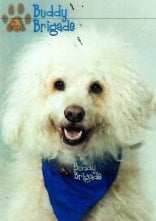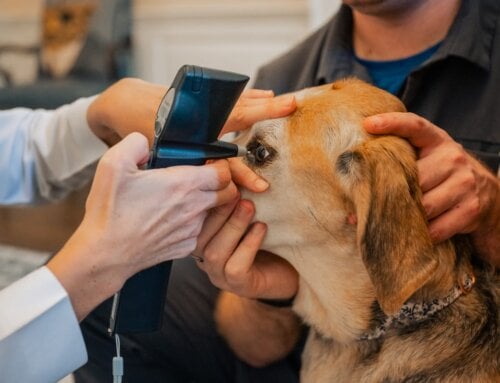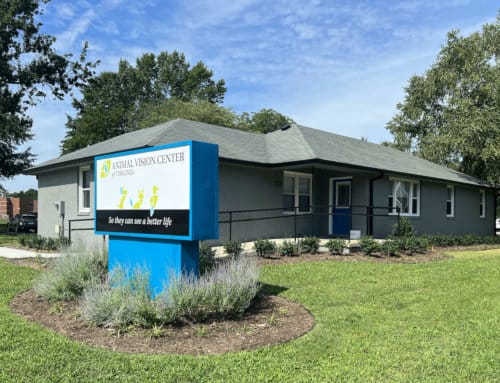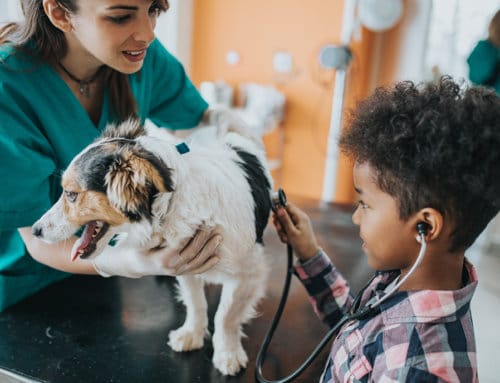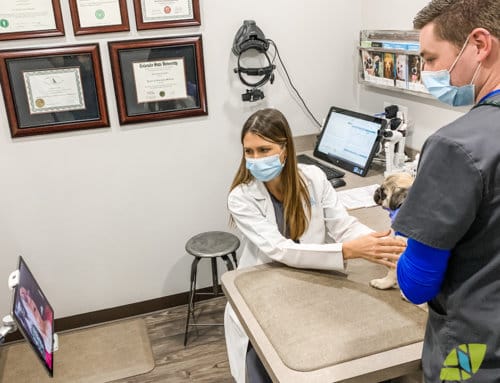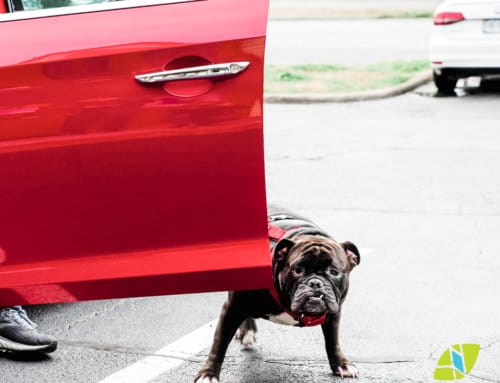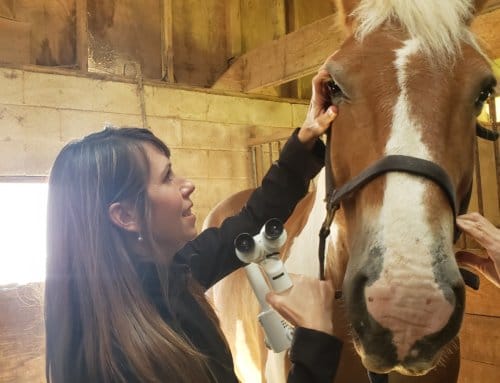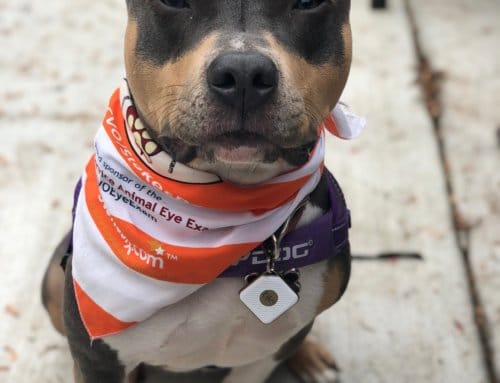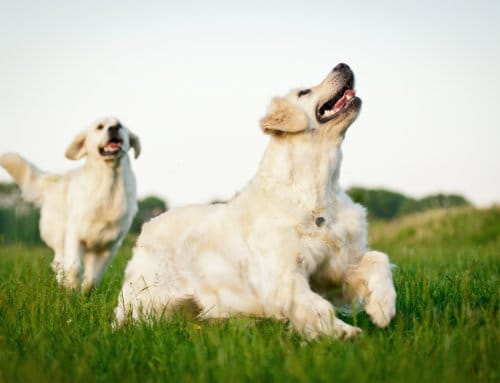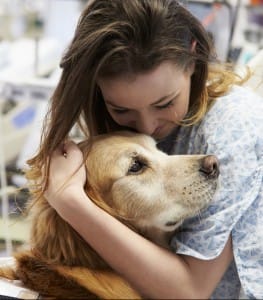 (April 5, 2018) – While dogs don’t wear glasses, they do need to have their eyes checked regularly, especially if they are a registered service or therapy animal. May is National Service Dog Eye Examination Month, and many board-certified diplomats of the American College of Veterinary Ophthalmologists will offer free screenings for these hard-working and caring creatures throughout the month. Animal Vision Center of Virginia (AVCVA) feels so strongly about the importance of healthy eyes for these pets, we perform free exams for qualified service animals all the yearlong. It helps us detect signs of ocular disease early, allowing the animals to keep up their important work without missing a beat.
(April 5, 2018) – While dogs don’t wear glasses, they do need to have their eyes checked regularly, especially if they are a registered service or therapy animal. May is National Service Dog Eye Examination Month, and many board-certified diplomats of the American College of Veterinary Ophthalmologists will offer free screenings for these hard-working and caring creatures throughout the month. Animal Vision Center of Virginia (AVCVA) feels so strongly about the importance of healthy eyes for these pets, we perform free exams for qualified service animals all the yearlong. It helps us detect signs of ocular disease early, allowing the animals to keep up their important work without missing a beat.
In recognition of the special awareness month, we are pleased to introduce you to Chester, a 10-year old labradoodle and registered therapy dog that is part of the Buddy Brigade at the Children’s Hospital of the King’s Daughters (CHKD) in Norfolk. We asked Chester’s owner, Mary Lou Nexsen, a few questions about his very important job:
- How long has Chester been a therapy dog and how did he get st
 arted with the Buddy Brigade? Chester has been a therapy dog for nine years. I had volunteered for the past 10 years with CHKD in their Child Life program, and I had seen the Buddy Brigade dogs and knew about the work they do.
arted with the Buddy Brigade? Chester has been a therapy dog for nine years. I had volunteered for the past 10 years with CHKD in their Child Life program, and I had seen the Buddy Brigade dogs and knew about the work they do.
- How does the Buddy Brigade work? When volunteering, we receive a list of patients, whose parents have given permission for a Buddy Brigade dog to visit their child. There’s a paw print on the door of the room, so we know where to go. Once we arrive, I’ll ask if they’d like to visit with Chester, and then I’ll pull a chair next to the bed so that he is at eye level with the child. They can pet and hug him. Sometimes they will ask to have Chester on the bed, and I’ll put a sheet on the area where he’ll be lying. We stay as long as the child wants us to stay.
- What is the reaction when visiting CHKD patients? It’s universally wonderful. A lot of the children are in discomfort, sad or frightened, and I have yet to see a child who didn’t brighten up and smile when Chester came in the room. It’s a wonderful distraction for parents and family members too. We were there recently and visited with a little girl in the oncology unit. She was obviously scared and sad. When she saw Chester, she instantly started smiling and hugging him around the neck. Her Dad started crying. He told me his daughter had not reacted positively to anything in the last month, and this was the best thing that had happened to her during her stay.
- What is involved with being a registered therapy dog? Chester is registered with Therapy Dogs International (TDI). The training requirements are listed online, and I started training him at when he was three months old to meet the criteria. Then I took him to a local TDI site to be tested. It’s not hard, especially if you have a dog with a good personality. They need to know how to sit, stay and come. They also need to know to leave something on the ground, such as medicine that they shouldn’t touch. CHKD also had their own separate and rigorous testing requirements for his being part of the Buddy Brigade.
- What is something that you’d like people to know about therapy dogs? Therapy dogs help people in ways that are indescribable. In addition to visiting children at CHKD, we interact with the staff. The nurses and doctors have stressful jobs, and they’ll pet and talk to Chester. It’s nice for them too. Chester and I were in the hospital lobby recently, and a visitor, maybe the mother of a patient came along and said, “Can I hug your dog?” She knelt down and just held on to Chester.
- Why is it important for service dogs to have their eyes checked? When we saw Dr. Heather last May, it was the first time I had known about these free vision checks for service and therapy animals. During the exam, she found a small growth on the bottom of Chester’s right eyelid that I hadn’t seen because it was quite small. She asked me to monitor it, which I did. In early March, we went back and she removed it. That was very valuable to have her professional examination of him. With her specialty in ocular care, she’s going to catch things that a regular veterinary exam might not determine. Keeping Chester healthy is a priority. He is not only a great family pet, but he also contributes so much in the community. In addition to visiting CHKD, we call on area nursing homes, schools, St. Mary’s Home and we go to libraries so children can ready stories to Chester.
- What does Chester enjoy doing on his days off? He likes to go hiking, walk along the beach and chase balls. He also enjoys agility courses. Chester has a very full life, and his therapy dog work has been a wonderful way for him to contribute to the community.
To qualify for AVCVA’s free eye screenings, animals must be active working animals that are certified by a formal training program or organization, or are currently enrolled in a formal training program. For more information about the referral process, or to schedule a screening, please contact [email protected].
